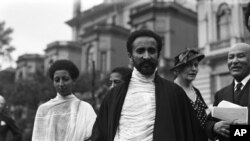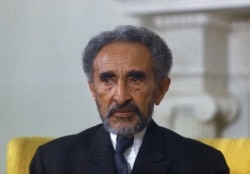Traveling to the British town of Bath has become a pilgrimage of sorts for people of Ethiopian heritage. When Ethiopian Emperor Haile Selassie had to go into exile, he landed in Bath. The town, about 145 kilometers west of London, hosted the emperor from 1936 to 1940.
When the Italians under Benito Mussolini invaded Ethiopia in 1935, Haile Selassie, was forced to temporarily go in exile in Britain. He lived in Bath at Fairfield House, which also hosted his family, closest confidants and entourage.
Ezra Tsegay is part of the Ethiopian diaspora community and organizes Ethiopian-related events several times a year at Fairfield House.
“We feel privileged that we are continuing a historical tradition,” Ezra said. “And I think it's a good thing that the emperor's name is remembered and the place is in use. And we feel very attached to the place emotionally.”
The emperor renovated the two-story house after he bought the property. Rooms are still decorated with impressive carpets and Ethiopian art, as well as photos of Haile Selassie. The property sits on nearly one hectare of land.
An estimated 90,000 people of Ethiopian heritage live in Britain. Most are based in London. One of them — Abiyou Desta — was visiting the former residence of the Ethiopian emperor for the first time.
“To be honest, as someone of Ethiopian heritage, I'm really feeling very proud about the place and about the king, what he was doing, Abiyou said. “The displays all over the walls from the first floor to the top floor are very informative. It tells you a lot of information about him, how he used to administer his country from here.”
The 25-room house is now a listed building, meaning changes cannot be made without prior approval. What once used to be the empresses’ office is now an office used by Fairfield project coordinators such as Pauline Swaby Wallace. She explains why the emperor gave Fairfield House to the city of Bath in 1958.
“He had come with money, he came with resources, but in time those resources had run out, so the people of Bath were kind enough to, you know, accept him in their community,” Pauline said. “Although they were told by our government that, you know, just leave him let him just live quietly at Fairfield House. So he was invited to events, and he invited people here. So I think the kindness that was shown to him, he showed it back by giving this gift.”
Besides the Ethiopian community, Rastafarians use the house as they revere Haile Selassie as God. But the house is mostly used as a day care center for the elderly.
After the Italians were driven out, Haile Selassie returned to Ethiopia, and ruled the country until he was deposed in 1974. He died in 1975.





